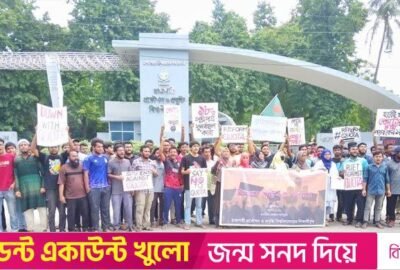Even if the disaster is over, the suffering is not over
Due to Cyclone Rimal, the waters of Sugandha, Bishkhali, Gabkhan and Halta rivers in Jhalkathi rose by 7-8 feet beyond the boundary line. Cities and villages are all submerged in it. Hundreds of thousands of trees of various species were uprooted due to the stormy winds. Thousands of people took refuge in shelters in such dangerous conditions on May 27.
Then from May 28, the water started to recede. The water of the reservoir has been spoiled by the accumulation of leaves and garbage. The stench is emanating from there. Meanwhile, the children and teenagers are panicking. This increases the risk of water borne diseases.
Not only the countryside, but also the streets of Jhalkathi town were submerged under water. Even though the water has receded from the main roads, there is still water in the neighborhoods. This water gets mixed in the sewer and has a black color and stinks. This situation has been going on for a week.
On Wednesday (June 5), various areas of the city can be seen on the ground, which originates from the estuary of the Basanda, Sugandha, Bishkhali and Gabkhan rivers flowing through the city and passes through Kathpatti, Arddarpatti, Palbari, Basanda, Nesharabad, Pipalita, Chamta to Baukathi for about 10 km. length About 12 km from Baukathi to Bhimruli Vasman Pearabagan to Gabkhan river and 9 km from Baukathi to Himanandakathi to Kuriana have turned black due to rotting leaves and garbage.
Juveniles swim frantically in the water of the entrance canal to the Bhimruli canal from Baukathi. They are swimming in groups without thinking about the color and smell of the water in intense heat. Also Krishnakathi Kaviraj Bari Road, Muslim Para, Adarshpara, Bau Bazar, Bishwa Road, Kutubnagar, Chandkathi, Rupnagar, Purba Chandkathi, Howladar Bari, Chairman Bari, Paschim Chandkathi, Govt College Front Lane, Bishwa Road, Under Basanda Bridge, Arddarpatti, Palbari, Madan Mohan Behind the Akhra house, Sheetalakhola, Loknath Mandir area, Amtala Gully Road, Basanda, Ichanil, Kirttipasha Mor, Kifaitnagar, Omeshganj, residential ponds adjacent to Ecopark, Kathpatti, Kalabagan, canals adjacent to City Park, Banshapatti areas are still waterlogged. Residents still have knee-deep water in front of their houses. This water is brown in color and smells bad. So the residents of those areas are in danger of water borne diseases.
Salahuddin, a resident of Krishnakathi area, said that to leave the house, one has to step through dirty water. For this, wives and children do not leave the house without special need. Even if he goes out himself, he returns home after completing the possible work of the whole day.
He said, earlier, because the water was high, dirty water did not come. Now as the water has reduced, the dirty water has turned black.
Swapna Begum, a resident of Purvachandakathi area, said that the water has gone down, but dirty water has accumulated in front of the house. The children of the house want to play in these waters. That is why they have to be kept under surveillance. Apart from this, the flood water washed away various garbage and accumulated in the house and its surroundings. Various insects including mosquitoes are born in stagnant water.
Municipal Mayor Liaquat Ali Talukder said, after the water receded, the municipal cleaning department formed a team and the cleaning operation is ongoing. Along with spraying medicine to kill mosquitoes and insects and spraying bleaching powder to remove bad smell has been taken.
Dr. Jhalkathi Civil Surgeon. HM Zahirul Islam said, till now there has been no outbreak of water borne diseases like diarrhea or other diseases. This is because pure water and water purification tablets have been distributed. However, after the water recedes completely, there is a fear of diseases spreading.
FA/ASM






